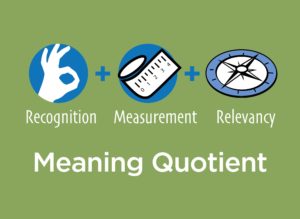Editor’s Note: Susan Heinzeroth delivered the following keynote address on Sept. 25, 2020, for the University of Colorado Staff Council’s Staff Excellence Awards ceremony.
 Without question, COVID-19 has caused tremendous loss and hardship in our community. We don’t want to minimize those difficulties, but we can appreciate the lessons this challenging period offers for us.
Without question, COVID-19 has caused tremendous loss and hardship in our community. We don’t want to minimize those difficulties, but we can appreciate the lessons this challenging period offers for us.
What I’ve observed in the way many people are responding gives me hope.
We are leaning into our humanness in new ways, embracing the messy process of learning and sustaining ourselves through community and common purpose. We are—by necessity—reprioritizing and focusing on what matters most.
When we focus on increasing what researchers Susie Cranston and Scott Keller call the “Meaning Quotient,” we become more resilient and more likely to achieve peak performance and joy. So today, I’ll unpack what ‘meaning’ entails and explore how the Meaning Quotient applies to our work and our lives.
Recognition: Affirming That We Matter
The first element of the Meaning Quotient is Recognition—and that’s what brought us together today. On occasions like this one, we recognize how weeks, months and perhaps years of work have culminated in a significant achievement. It’s important to celebrate big milestones and accomplishments, AND it’s just as important to embed recognition into our daily work.
Why does recognition matter?
- It affirms that we matter—that our contributions are valued.
- It gives us insights into strengths we may not realize we have.
- It encourages us to keep going, even if our progress is slower or harder than we hoped.
Recognition doesn’t have to be an expensive reward or highly public, although it can be. What matters most is building recognition into the way we work together and offering different types of recognition to match the preferences of the people we’re celebrating. For some people, a personal note of appreciation will mean the most. For others, a callout in a team meeting matters more.
The primary takeaway—whether you’re a leader or a coworker—is to commit to recognizing the talents and contributions of those around you. It makes a difference.
 Measurement: Driving Learning and Growth
Measurement: Driving Learning and Growth
The second element in the Meaning Quotient is measurement. Measurement is important because it indicates we value something enough track it. Measurement gives us line-of-sight into how our work supports larger objectives. As our metrics improve, we can see exactly what that means for the organization.
If we bring the right mindset to this process, it can also bring us joy.
What do I mean by mindset?
As we all know, learning involves struggle and hard work. It often requires us to challenge our existing beliefs and assumptions. It requires us to be vulnerable and open to feedback.
It asks us to lean into our humanness—to look to each other for encouragement and guidance.
The learning process can be painful or exciting, depending on our mindset.
Carol Dweck of Stanford University articulated this idea in her book “Mindset: The New Psychology of Success.” Through her research, she developed a powerful theory about growth versus fixed mindsets.
According to Dweck, those with growth mindsets believe that abilities can be developed. Instead of judging themselves if they aren’t exceptional at everything, they find joy in getting better.
By contrast, those with fixed mindsets believe that abilities are set. If they don’t succeed right away, they become discouraged or defeated.
If we bring a growth mindset to our work, then measuring our progress will be exciting and affirm that—step by step—we’re getting better.
Relevancy: Fueling Our Work with Purpose
The last element in the Meaning Quotient is relevancy. In the business world, we once believed that people were primarily motivated by money or advancement opportunities. Although both matters, we now know that a better predictor of employee engagement and productivity is purpose—the sense of doing work that makes a difference for a larger whole.
The question each of us must answer is, “What is my purpose? What do I do that contributes to a larger whole?”
Our sense of purpose grows over time along a predictable trajectory. I call this the “Me—>We—>World” continuum.
It starts with understanding our own talents, abilities and interests and taking care of ourselves so we can give to others.
We can then grow and contribute to our own team and organization. As our abilities and resilience increase, we can look outward even further and identify ways to contribute to the larger world.
The Great Use of Life
Far from being a mystery, meaning is something we can deliberately cultivate in our lives and our work. You now know the formula:
Recognition + Measurement + Relevancy = Meaning Quotient
If we apply that knowledge and continue to pursue meaning and excellence throughout our lives, we will eventually be able to look back and discover we’ve built a legacy. Others will learn from our journey—and be enriched by it as they travel their own paths.
And the good news is that we don’t have to achieve perfection to create a meaningful legacy.
Rather, our greatest achievements come when we lean into our humanness, allow ourselves to be vulnerable and open to growth and dedicate ourselves to contributing to a larger purpose and the larger world.
As the philosopher William James said, “The great use of life is to spend it for something that will outlast it.”
By celebrating each other, measuring our progress, and pursuing larger purposes together, we can create meaning and joy in our lives. Let’s commit to making that our shared legacy.
Thank you.


 Measurement: Driving Learning and Growth
Measurement: Driving Learning and Growth Build a community of mentors, sponsors and coaches to reach your full professional potential
Build a community of mentors, sponsors and coaches to reach your full professional potential